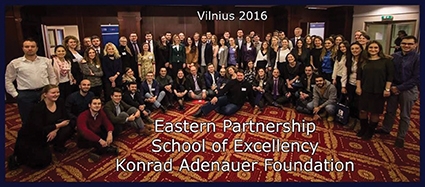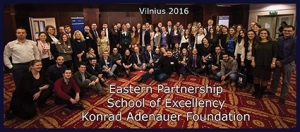KAS School of Excellency Unites Young Leaders from EaP Countries & Russia
Two weeks ago, when the European Council and European Parliament reached agreement on the visa liberalization suspension mechanism for Georgia and Ukraine, overcoming the largest obstacle remaining to granting visa-free travel to the citizens of these two countries, The Guardian, The Independent and a host of other Western media reported on the occasion with headlines such as “EU Just Granted Free Travel to 50 mln People.” Thinly veiled and eager to be discovered, the mammoth bottom line reads: “As if we didn’t have enough things to worry about already.”
For the two EaP countries, eagerly anticipating this very access for more than two years now, this surely must have felt like a bucket of cold water. Is this how people in Europe feel about us? The question is both fair and hard to answer. What is clear, though, is that the EU and EaP countries need to be on the same page to avoid creating false expectations and, ultimately, disillusionment with the Brussels enterprise, especially with the omnipresent Russian presence in the region.
The Kremlin would like nothing more and spares no efforts to win in the regional edition of Hold’em poker, a term recently coined to describe Russia’s sprawling geopolitical manoeuvres. Equally important is that these countries are well-versed in each other’s state of affairs, and despite varying progress towards European integration, a connection is maintained at every level.
It is at such times that civil society has to step up, unburdened by government agenda or the private sector’s profit-oriented policies, to provide a platform for dialogue and sharing of know-how, as well as establishing of a resilient network of pro-European minds.
And that’s exactly what one German foundation is doing. A proud legacy of one of the brightest political minds of 20th century, the chancellor of Germany Konrad Adenauer, The Konrad Adenauer Stiftung has launched an ambitious series of School of Excellency programs aiming to bring together “about 100 up-and-coming politicians, journalists/bloggers, experts from non-government organizations and think tanks, as well as young academics, legal experts and members of the scientific community from the countries of the Eastern Partnership (and Russia)”.
Adenauer was an expert deal-maker and the Foundation takes a similar approach: the exchange of views and ideas, with the ultimate goal of fostering European ideas and democratic values. They also believe in a long-term approach– the programme is three years long, with multiple seminars and conferences per year planned in various countries.
Being a lucky member of the very first wave of participants, I had the privilege to participate in the first three-day conference in Vilnius, Lithuania. The venue was well-chosen: there is much to learn from the Baltic States, EU members since 2004, in terms of European integration. Theirs is a success story that should serve (and does so) as an inspiration. Add to that the shared factor, or rather, threat, of Russia and you have a perfect stepping stone for delving into the intricacies of EaP regional politics.
The conference boasted prominent names from Lithuanian politics and expert circles, from young MP Layrunas Kasciunas, who very straightforwardly pointed out the problems pertaining to the EaP’s uncertain future, to the President of the Constitutional Court, who preached on the internationally acclaimed effectiveness of Lithuania’s foremost legislative document and the myriad of normative obstacles needed to be satisfied in order to alter it; a controversial issue in South Caucasus countries, where tailoring the Constitution to governmental needs remains a common practice. The torch was picked up by Petras Auštrevicius, among others, the chief negotiator for Lithuania’s accession into the European Union and who was kind enough to backtrack the European integration process from the point of successfully crowning with membership.
On the final day, a memorable speech was delivered by MP Žygimantas Pavilionis, who urged all countries not to “shy away from a fight for European values and a European future.”
All in all, all Lithuanian speakers were staunchly pro-European, and while that didn’t come as surprise, it made one wonder just how much these voices are listened to in Brussels with giants France and Germany maintaining their more sceptical stance.
Another regional dimension was provided by two speakers from the Balkans, and while not an eye-opening moment, it was a good reminder for most of us that the Copenhagen criteria came into being mostly due to the EU’s intention to pacify “the war-torn Balkans with the premise of membership and policy of conditionality,” as Serbian speaker Dr. Duro Duric aptly put it.
The issue of a hybrid war being waged by Russia was a pre-eminent one throughout the conference and it reached a culmination at the showing of a wonderfully made documentary from Latvian filmmaker Sandra Užule-Fons through Polish funding. Baltic Poker: What is Putin's game? is a sobering and uncompromising piece depicting the gritty reality that has come into life through the manoeuvres of Putin’s Russia and giving food for thought aplenty – if the citizens of the European Union feel so vulnerable to the Kremlin, then what does it say about the hopes of Georgia and Ukraine – that the western influence will shield them from the wrath of their northern bear? This and more was discussed during the working sections, divided between subjects of security, economics and European values. Awareness of what happens in one’s neighborhood was mentioned above as a crucial aspect: the country presentations presented by fellow participants were definitely a great step in this direction.
Last but not the least, while speakers and active participants always take the spotlight, one often forgets the amount of work that organizing such a massive event requires. Especially if everything runs smoothly. Not willing to be called out on being ungrateful, I therefore congratulate all the organizers, without singling anybody out, with the stellar work they did. And the last bit of good news: the next conference is due to be in Tbilisi. Mission: Democracy goes on.
Vazha Tavberidze












